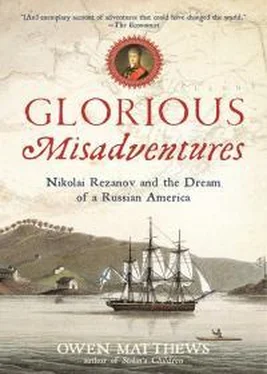Such entertaining cases as the turbulent Hannibal clan provided were however relatively rare. Rezanov seems to have had a good head for figures and a certain pedantic flare for the nuts and bolts of administration. These talents landed him with an even more boring job, if that were possible, than that of court assessor. For six months a year he was seconded to the Pskov provincial treasury, housed in the mansion of the merchant Postnikov. The house still stands, a stolid seventeenth-century building which is now the town’s historical library. Its domed ceilings, tiny barred windows and thick walls breathe the oppressive heaviness of medieval Russia, an impression reinforced by the fact that the house has sunk below the level of the modern street like a waterlogged barge. One imagines the young Rezanov, surrounded by brass inkwells and massy medieval treasure chests left over from the town’s more prosperous days, staring out of these windows towards the dripping pine forests and dreaming of escape.
By 1788 Rezanov, now twenty-four, had again decided that he had had enough. As in the army, Rezanov had served nearly five years without promotion. Unlike the army, however, there was no inbuilt mechanism for the wholesale slaughter of his superiors in the line of work. Furthermore, in 1763 the Empress had decreed that advancement in the civil service would come automatically through length of service rather than merit. It was a perfect formula for the institutionalization of mediocrity.
Given the remarkable imagination, energy and diplomatic skills Rezanov was to demonstrate later in his career, it seems likely that his talents had simply been buried under the dead hand of his placeman superiors. In any case, in February 1788 Rezanov applied to the court for a leave of absence and an internal passport for travel to St Petersburg. In May he wrote again for an extension of his leave – on full pay, collected weekly by his younger brother Dmitry – claiming that he was planning to rejoin his old regiment. This seems unlikely. The Izmailovsky Guards had been mobilized the previous autumn when the Ottoman empire declared war in an ultimately futile attempt to recover territories lost to Rezanov’s swashbuckling grandfather, General Gavriil Rezanov. By spring 1788 the great fortress of Ochakov, on the shores of the Black Sea in modern Bulgaria, had fallen to a desperate Russian assault, and the regiment was moving on to further glories before the Ottoman fortresses of Bendery and Brailov. Rezanov had definitively missed them.
Instead the young nobleman-judge-treasury-secretary was busy advertising himself in the ministerial waiting rooms and salons of the capital, paying court, as contemporary Englishmen would call it, to the great and the good in search of a vacancy commensurate with his and his family’s social traction. In this regard Rezanov had several obstacles to overcome. His first and most serious handicap was that his maternal grandfather General Gavriil Okunev, the old soldier who had been in charge of all shipbuilding on the Baltic, had died in 1781. Another was that his uncle Ivan Rezanov had inconveniently and quite suddenly fallen from royal favour.
Uncle Ivan had risen up the bureaucracy with giddying speed, first in the Ministry of Foreign Affairs and later as secretary to the chief procurator of the Senate, Prince Alexander Vyazemsky. Political decision-making in Russia rested solely with the Empress, but the Senate – essentially a talking shop for the senior nobility – drafted laws and petitions for Her Majesty’s approval and controlled a network of judicial and bureaucratic appointments second only to the Palace itself.
Ivan Rezanov’s social and, he doubtless hoped, political ace in the hole had been his beautiful daughter Maria. She soon became the mistress of Prince Vyazemsky, who was certainly powerful but, unfortunately for the Rezanovs, already married. This arrangement was not as prestigious for Ivan Rezanov as having Vyazemsky as an official son-in-law. But Vyazemsky’s wife was wise enough to ignore the liaison, and the prince, in due course, did the right thing and found a wealthy and well-heeled husband for his pretty young mistress. In 1783 the girl became engaged to Lieutenant General Ivan Yakobi, the governor-general of Irkutsk. Thus Ivan Rezanov was poised to set up his daughter with a powerful and rising nobleman and advance his own career to boot.
Alas, the Empress disagreed. Despite having a vast and unruly empire to run, Catherine took an intense interest in the love lives of Russia’s aristocracy and devoted a remarkable amount of time to matchmaking and, in the case of the Rezanova–Yakobi engagement, match-breaking. She seems to have wanted to punish Vyazemsky, who had incurred the Empress’s disfavour by dragging his feet over her proposed Code of Laws. ‘I don’t want this Vyazemsky to give his Rezanova to Yakobi and present her with all Siberia as her dowry,’ the Empress wrote at the beginning of the winter season of 1783. Catherine intended to offer Yakobi, a dashing and wealthy widower, as a marital prize to a more loyal courtier.
Both Vyazemsky and Yakobi survived this minor social debacle; only Ivan Rezanov’s fortunes waned in the wake of the embarrassment. By the time his nephew came looking for a job in 1788 Ivan had disappeared from the Senate’s records and retired from the civil service into genteel obscurity.
In December 1788 Rezanov went to work for the Treasury, presumably on the strength of his Pskov accounting experience. He remained at the post for nearly two years. Alexander Radishchev, a radical and one of the greatest oppositional minds of his age, was his colleague. Radishchev was thirteen years Rezanov’s senior in years but one step below him in bureaucratic rank; he had studied at the University of Leipzig and returned full of Jacobin ideas.* Rezanov was either nervous of befriending such a dangerous mind or found Radishchev’s radicalism distasteful. In any case, the two men never became friends. Instead Rezanov used his toehold in the bureaucracy of the capital to work on his late grandfather Okunev’s connections. Belatedly these came through, even ten years after the old man’s death. In 1791 the Admiralty finally offered a suitable position to the old shipbuilder’s young grandson, as junior secretary to Count Ivan Grigoryevich Chernyshev, vice president of the Navy Board.8
Chernyshev had been one of the original backers of Catherine the Great’s coup and had served as her ambassador in London for many years before returning to Russia and the gigantic estate of Alexandrino, given to him by a grateful empress.9 He was a powerful patron, and Rezanov, showing a talent for both administration and ingratiation that would stand him in good stead in the future, quickly became Chernyshev’s chef de cabinet . In less than three years Rezanov had moved from provincial mediocrity to within touching distance of the court itself.
Catherine had seized the throne when Nikolai Rezanov was just six months old. In the intervening twenty-four years she had applied her extraordinary energy to remaking the Russian Empire in her own image. Born a minor German princess, she had not a drop of Russian blood. As a daughter of Europe, Catherine saw herself as the spiritual successor of Peter the Great’s quest to bring Russia to civilization and greatness. Indeed she saw those two concepts as inextricably linked. The neoclassical palaces and boulevards of St Petersburg which took shape during her reign were a mirror to a larger civilized world that she was determined Russia should join.10
Like Peter she believed that only an enlightened absolute monarch, supported by an educated aristocracy, could reform Russia. But where Peter had indulged in impulsive, almost boyish, enthusiasms for the kind of grand engineering projects that brought instant gratification – his navy, for instance, his capital, or the Ladoga Canal – Catherine tackled the fundamental architecture of the state itself. In the early years of her reign she banned judicial torture and experimented with a nobles’ assembly and a basic constitution. She undertook a massive codification of Russia’s tangled mass of statute and common law, drafting many of the clarifications personally. ‘Russia is a European State,’ Catherine wrote in a preamble to her Instruction on Laws – written in French.11 ‘There are 20 peoples of various kinds in this town who do not in any way resemble each other. And yet we have to make a coat which fits them all. I might say that there is almost a whole world to be created, united, preserved,’ she wrote to Voltaire, the leading public intellectual of the day, from Kazan in May 1767 during a barge cruise down the Volga. ‘Imagine I beg you that these laws must serve for Asia as well as for Europe . . . Here I am in Asia.’12
Читать дальше












